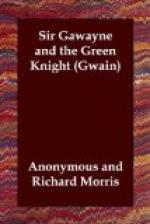“In god fayth,”
quod Gawayn, “gayn hit me þynkke3,
[A] Þa3 I be not now he þat 3e of speken;
To reche to such reuerence as 3e reherce
here
1244 I am wy3e vn-worþy, I wot wel my-seluen;
Bi God, I were glad, & yow god þo3t,
[B] At sa3e oþer at seruyce þat I sette my3t
To þe plesaunce of your prys, hit were a
pure ioye.”
1248 “In god fayth, sir Gawayn,” quod
þe gay lady,
“Þe prys & þe prowes þat plese3 al
oþer,
If I hit lakked, oþer set at ly3t, hit were
littel daynte;
[C] Bot hit ar ladyes in-no3e, þat leuer wer
nowþe
1252 Haf þe hende in hor holde, as I þe habbe
here,
To daly witt derely your daynte worde3,
Keuer hem comfort, & colen her care3,
[D] Þen much of þe garysourn oþer golde þat[1]
þay hauen;
1256 Bot I louue[2] þat ilk lorde þat þe lyfte
halde3,
I haf hit holly in my honde þat al desyres,
þur3e grace.”
Scho made hym so gret chere,
1260 Þat wat3 so fayr of face,
[Fol. 108.]
[E] Þe kny3t with speches skere,
A[n]swared to vche a cace.
[Sidenote A: “I am unworthy,” says
Sir Gawayne, “to reach to such reverence
as ye rehearse.]
[Sidenote B: I shall be glad, however, to please
you by word, or service.”] [Sidenote C:
“There are ladies,” says his visitor, “who
would prefer thy
company]
[Sidenote D: to much of the gold that they possess.”]
[Sidenote E: The knight answers the lady’s
questions.] [Footnote 1: Ms. þat þat.]
[Footnote 2: louie or loune (?).]
VI.
[A] “Madame,” quod
þe myry mon, “Mary yow 3elde,
1264 For I haf founden, in god fayth, yowre fraunchis
nobele,
& oþer ful much of oþer folk fongen hor dede3;
Bot þe daynte þat þay delen for my disert
nysen,
Hit is þe worchyp of your-self, þat no3t
hot wel conne3.”
1268 [B] “Bi Mary,” quod þe menskful,
“me þynk hit anoþer;
For were I worth al þe wone of wymmen alyue,
& al þe wele of þe worlde were in my honde,
[C] & I schulde chepen & chose, to cheue me a
lorde,
1272 For þe costes þat I haf knowen vpun þe kny3t
here,
Of bewte, & debonerte, & blyþe semblaunt,
[D] & þat I haf er herkkened, & halde hit here
trwee,
Þer schulde no freke vpon folde bifore yow
be chosen.”
1276 “I-wysse, worþy,” quod þe wy3e,
“3e haf waled wel better,
[E] Bot I am proude of þe prys þat 3e put on
me,
& soberly your seruaunt my souerayn I holde
yow,
& yowre kny3t I be-com, & Kryst yow for-3elde.”
1280 Þus þay meled of much-quat, til myd-morn
paste,
& ay þe lady let lyk, a[1] hym loued mych;
[F] Þe freke ferde with defence, & feted ful
fayre.
Þa3 I were burde bry3test, þe burde in mynde
hade,
1284 Þe lasse luf in his lode, for lur þat he
so3t,
boute hone;
Þe dunte þat schulde[2] hym deue,
& nede3 hit most be done;
1288 [G] Þe lady þenn spek of leue.
He granted hir ful sone.




